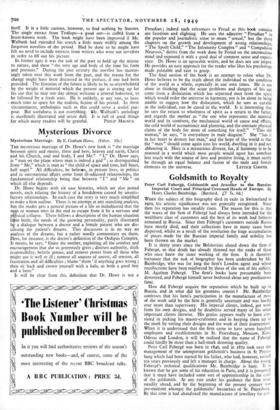Mysterious Divorce
Mysterious Marriage. By E. Graham Howe. (Faber. 15s.) THE mysterious marriage of Dr. Howe's new book is " the marriage between spirit and matter, there and here, heaven and earth, Christ and his Church, soul and body, I and Me." " I," Dr. Howe says, is " man on the plane where man is indeed a god " ; as distinguished from " Me," which is man as " the child of space and time, half beast, half angel." All difficulties, he believes, in private lives, in politics and in international affairs come from ill-adjusted relationships, the fundamental relationship being that between " I " and "Me " on which all else depends.
Dr. Howe begins with six case histories, which are also potted novels, each relating the history of a breakdown caused by unsatis- factory relationships. In each case the story is very much simplified to make a firm outline. There is no attempt at any searching analysis, but the reader gets a general picture of a life so maladjusted that the man or woman tries in the end to escape from it by a nervous and pt$rsical collapse. There follows a description of the human situation f em birth, the needs of the growing personality, partly illustrated by a dialogue between a doctor and a female patient who are dis- cussing the patient's dreams. This discussion is in no way an analysis of the dreams, but a rather woolly commentary on them. Here, for instance, is the doctor's definition of the Oedipus Complex. It means, he says, " Enjoy the mother, exploiting all the comfort and encouragement that she so generously gives ; distrust authority, shirk responsibility, belittle genius, and remove power from all those who might use it well or ill ; remove all sources of unrest, all tension, all frustration and all difficulties ; blame them' if anything goes wrong ; then sit back and crown yourself with a halo, as both a good boy and a hero."
It will be clear from this definition that Dr. Howe is not a Freudian ; indeed such references to Freud as this book contains are facetious and slighting. He uses the adjective " Freudian" in the popular and journalistic sense to mean " sexual," but the three chapters on the growth and development of wrong relationships, " The Spoilt Child," "The Inferiority Complex " and " Compulsion Neurosis," derive from the work done by Freud on the unconscious mind and expound it with a good deal of common sense and experi- ence. Dr. Howe is an agreeable writer, and he does not use jargon. He provides an easy approach for the reader who likes his psychology made palatable and easy to grasp.
The final section of the book is an attempt to relate what Dr. Howe believes to be the truth about the individual to the condition of the world as a whole, especially in our own times. He is not alone in thinking that the acute problems and dangers of his age come from a dislocation which has separated man from the spirit which would order the universe in harmony, nor is he alone in being unable to suggest how the dislocation, which he secs as curable in the individual, can be cured in the world. It is interesting that he sees the return to wholeness of spirit as a return to the father, and regards the mother as " the one who represents the -material world and its comforts, the mechanical world of cause and effects, the cold world of accountancy and planning, and the constant physical claims of the body for more of something for itself." "This old woman," he says, " is everywhere in male disguise." She "has it in her heart to destroy her man," and the hope of the world is that the " man " should come again into his world, dwelling in it and not abhorring it. Here is a mysterious divorce, for, if harmony is to be restored in a world which most people would agree has somehow lost touch with the source of love and positive living, it must surely be through an equal balance and fusion of the male and female
elements in the universe. LETTICE COOPER.














































































 Previous page
Previous page